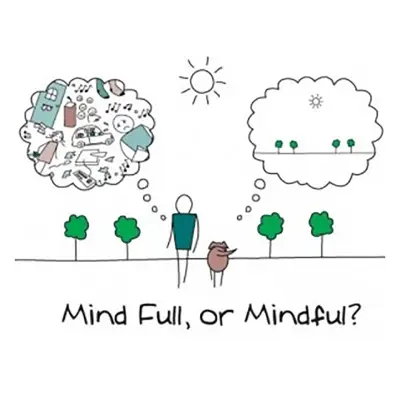The fear of the unknown is something everyone experiences at some point in their lives. Whether it’s starting a new job, moving to a different city, or facing an unexpected change, uncertainty can trigger anxiety and discomfort. However, this fear doesn’t have to control your life. In this guide, we’ll examine why people fear the unknown and provide a step-by-step approach to overcoming it.
Jump to:
Recommended for you!
Best SellersWhy Do We Fear the Unknown?

Fear is deeply rooted in both our biology and our experiences, which influence how we respond to uncertainty:
1. Evolutionary Instincts
Fear of the unknown is an ancient, primal instinct that has helped humans survive for thousands of years. Early humans who were cautious of unfamiliar situations were more likely to avoid danger, whether it was a predator or a hazardous environment. This cautiousness ensured their survival, and over time, this instinct became deeply ingrained in our DNA. Even though the dangers we face today are different, this primal response still kicks in when we’re confronted with uncertainty. This is why new experiences, unfamiliar environments, or situations where we don’t know the outcome can cause fear and anxiety.
2. Desire for Control
Humans have an inherent need for control in their lives. We find comfort in predictability because it allows us to prepare for what’s coming, manage risks, and feel secure. When we’re faced with the unknown, this sense of control is threatened, leading to feelings of helplessness and fear. The unknown challenges our ability to predict and manage outcomes, which can be unsettling. This loss of control is particularly distressing for people who rely heavily on structure and routine. Understanding that some level of uncertainty is inevitable can help reduce the anxiety associated with it.
3. Past Experiences
Your personal history plays a role in shaping your response to the unknown. If you’ve had negative experiences with uncertainty in the past—such as a failed venture, a relationship that ended unexpectedly, or any situation where the unknown led to pain or disappointment—you may develop a stronger fear of uncertainty in the future. These past experiences create mental associations between the unknown and negative outcomes, making it harder to approach new situations with an open mind. Recognising these patterns can help you begin to break free from them and approach the unknown with a fresh perspective.
4. Societal Influences
Society often encourages us to value stability and predictability. From a young age, we are taught to plan our lives meticulously—choose a career path, save for retirement, and avoid risks whenever possible. This cultural emphasis on certainty can make the unknown seem even more daunting. When everyone around you appears to have a clear plan, embracing uncertainty can feel like stepping out of line. However, it’s important to remember that life is inherently unpredictable, and societal norms should not dictate how you handle the unknown. Embracing uncertainty can lead to personal growth and opportunities that a rigid mindset might prevent.
Step-by-Step Guide to Overcoming the Fear of the Unknown

Overcoming the fear of the unknown is a process that requires patience and practice. The following steps will guide you through this journey, helping you build confidence and reduce anxiety as you face life’s uncertainties.
Step 1: Acknowledge Your Fear
The first step in overcoming any fear is to acknowledge it openly and honestly. Many people try to ignore or suppress their fear of the unknown, hoping it will go away on its own. However, pretending that your fear doesn’t exist only gives it more power over you. Instead, take a moment to sit with your feelings. Recognise that it’s natural to feel afraid when you’re uncertain about what lies ahead. By acknowledging your fear, you start to take control of it, rather than letting it control you. This self-awareness is essential because it forms the foundation for all the other steps in this guide.
Step 2: Identify What You Can Control
One of the most effective ways to reduce fear is to focus on the aspects of a situation that you can control. While the unknown often feels overwhelming because of the many variables you cannot predict, there are always elements within your control. Start by making a list of these controllable factors. For example, if you’re starting a new job, you can control how well-prepared you are, your attitude towards learning, and how you approach your first day. By concentrating on these areas, you can create a sense of empowerment that helps diminish the anxiety associated with the unknown. This approach shifts your focus from what you can’t control to what you can, making the situation feel more manageable.
Step 3: Reframe Your Perspective
How you perceive the unknown plays a role in how much fear it generates. If you view uncertainty solely as a source of potential failure or disappointment, your fear will likely intensify. However, if you can reframe the unknown as an opportunity for growth, learning, and new experiences, your perspective begins to change. Instead of asking, “What if everything goes wrong?” try asking, “What if this turns out to be the best thing I’ve ever done?” This shift in mindset can transform fear into excitement and anticipation. By viewing uncertainty as a blank canvas rather than a dark void, you open yourself up to possibilities that you might have otherwise missed.
Step 4: Take Small Steps Toward the Unknown
Overcoming the fear of the unknown doesn’t require a giant leap; often, it’s more effective to take small, manageable steps. Begin by challenging yourself with minor uncertainties in your daily life. This could be as simple as trying a new food, taking a different route to work, or starting a conversation with someone new. Each small step you take builds your confidence and resilience, making it easier to face larger uncertainties over time. The goal is to gradually expand your comfort zone, proving to yourself that you can handle uncertainty without disastrous consequences. Over time, these small victories will accumulate, and the unknown will seem less intimidating.
Step 5: Practice Mindfulness
Mindfulness is a powerful tool for managing anxiety and staying grounded when faced with uncertainty. By focusing on the present moment, mindfulness helps you avoid getting lost in worries about the future. Techniques such as deep breathing, meditation, and mindful observation can calm your mind and reduce the intensity of your fear. For example, when you notice your thoughts drifting towards anxiety about the unknown, take a few deep breaths and bring your attention back to the present. Ask yourself, “What is within my control right now?” and focus on that. Regular mindfulness practice can help you develop a more balanced and calm approach to uncertainty, making it easier to cope with the unknown.
Step 6: Build Resilience
Resilience is the ability to bounce back from setbacks and adapt to change. Developing resilience is crucial for coping with the unknown because it provides the mental and emotional strength needed to face challenges head-on. You can build resilience by cultivating a positive mindset, maintaining strong social connections, and learning from past experiences. When you face uncertainty, remind yourself of times when you’ve successfully navigated difficult situations before. Reflecting on these experiences can boost your confidence and reassure you that you have the capability to handle whatever comes your way.
Step 7: Seek Support from Others
You don’t have to face the unknown alone. Seeking support from friends, family, or professionals can provide you with different perspectives and reassurance when dealing with uncertainty. Talking about your fears with someone you trust can help you feel less isolated and more understood. Additionally, others may offer practical advice or insights that you hadn’t considered. If your fear of the unknown is particularly overwhelming, consider seeking help from a therapist or counsellor who can work with you to develop coping strategies. Reaching out for support is a sign of strength, not weakness, and can make a significant difference in how you handle uncertainty.
Step 8: Reflect and Celebrate Progress
As you work through these steps, it’s important to take time to reflect on your progress. Acknowledge the steps you’ve taken, no matter how small, and celebrate your successes. This could be as simple as journaling about a situation where you successfully managed uncertainty or treating yourself to something you enjoy after facing a challenge. Celebrating progress reinforces positive behaviour and boosts your confidence, making it easier to continue facing the unknown with courage. Reflection also allows you to assess what strategies are working for you and where you might need to make adjustments. Over time, this practice of reflection and celebration will help solidify your growth and resilience.
Recommended for you!
Best SellersFrequently Asked Questions About the Fear of the Unknown
Is the fear of the unknown the strongest fear?
The fear of the unknown is indeed one of the most powerful fears, but its intensity can vary from person to person. For some, it may be their strongest fear, while others may find fears like failure or rejection more overwhelming. The strength of this fear often depends on individual experiences and how much value a person places on certainty and control.
Can the fear of the unknown cause physical symptoms?
The fear of the unknown can manifest in physical symptoms. Anxiety related to uncertainty can lead to symptoms such as a racing heart, sweating, trembling, shortness of breath, and even digestive issues. These symptoms occur because your body is responding to perceived danger, triggering the “fight or flight” response.
How does fear of the unknown affect decision-making?
The fear of the unknown can significantly impact decision-making by causing indecision, overthinking, and avoidance. When faced with uncertainty, some people may delay making decisions in an attempt to avoid potential negative outcomes. This hesitation can lead to missed opportunities and increased stress. They may also choose the option that feels the safest instead of taking risks, which can again lead to missed opportunities.
Is the fear of the unknown common in children?
The fear of the unknown is common in children, as they are still learning about the world and how it works. Unfamiliar situations, new environments, or changes in routine can be particularly frightening for children. This fear usually diminishes as they grow older and gain more experience, but it can persist if not addressed.
What is an example of fear of the unknown?
An example of the fear of the unknown could be the anxiety someone feels when moving to a new city where they don’t know anyone. The uncertainty about making new friends, finding a job, or adjusting to a different environment can create significant fear. This fear might prevent them from taking the leap, even if the move could ultimately lead to positive outcomes.
How can I support someone who has a strong fear of the unknown?
Supporting someone with a strong fear of the unknown involves being patient, understanding, and encouraging. Listen to their concerns without judgment, and help them break down overwhelming situations into smaller, manageable steps. Offering to accompany them through uncertain experiences or helping them focus on what they can control can also be beneficial.
Does the fear of the unknown get worse with age?
The fear of the unknown can change as people age, but whether it worsens or diminishes depends on the individual. Some people become more fearful as they age due to increased awareness of life’s uncertainties and potential risks. Others may become more confident and adaptable, having faced and overcome many unknowns throughout their lives.
What role does self-confidence play in overcoming the fear of the unknown?
Self-confidence is key to overcoming the fear of the unknown. When you believe in your ability to handle whatever comes your way, the unknown becomes less daunting. Building self-confidence through small successes and positive self-talk can help reduce the anxiety associated with uncertainty.
Can practising gratitude help reduce the fear of the unknown?
Practising gratitude can indeed help reduce the fear of the unknown. Focusing on what you’re thankful for can shift your mindset from fear to appreciation. It encourages you to recognise the positive aspects of your life, which can provide a sense of security and reduce anxiety about the future.
How does the fear of the unknown relate to anxiety disorders?
The fear of the unknown can be a significant component of anxiety disorders, particularly Generalised Anxiety Disorder (GAD). People with anxiety disorders often struggle with excessive worry about potential future events and uncertainties, leading to heightened fear and distress. In such cases, professional treatment, such as cognitive-behavioural therapy (CBT), can be beneficial.
Study Mindful Mental Health for £29
The fear of the unknown is a natural part of being human, but it doesn’t have to control your life. If you're ready to overcome your fear of the unknown and enhance your mental well-being, consider enrolling in the Mindful Mental Health Diploma Course with Centre of Excellence. This course offers practical tools and insights to help you manage anxiety, improve your mental health, and embrace life's uncertainties. And right now, you can enrol for just £29!













